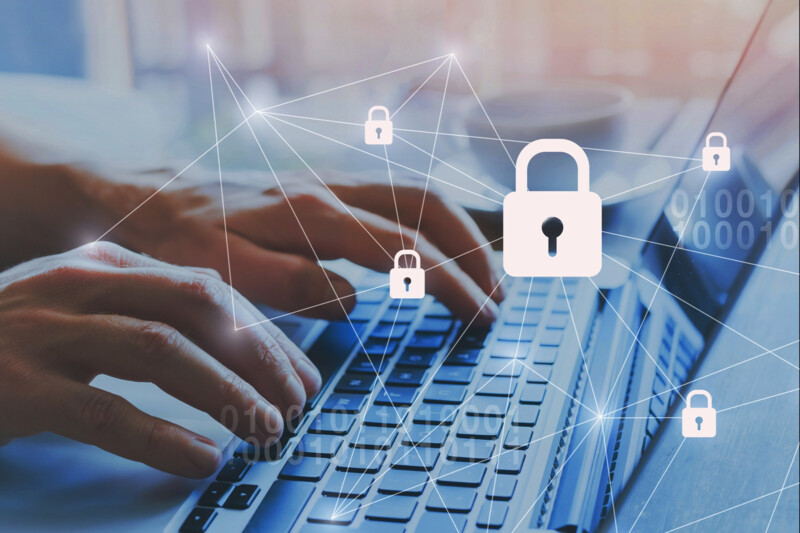Afin d’éviter les risques de piratage de vos comptes en ligne, il existe aujourd’hui des mesures simples à mettre en œuvre et qui vous permettront d’utiliser ces comptes en toute tranquillité. Si ces bonnes pratiques sont à adopter impérativement pour maximiser la sécurité de vos comptent qui gèrent des données financières ou personnelles, n’oubliez pas d’y recourir également pour l’ensemble de vos comptes en ligne (réseaux sociaux, adresses électroniques, service des impôts, assurance maladie, caisse d’allocations familiales…).

Pourquoi est-il indispensable de sécuriser ses comptes en ligne ?
Dans son édition 2021, l’INSEE signale que 50 % des usagers d’internet dans l’Union européenne, interrogés entre 2018 et 2019, ont été exposés à des tentatives de la part de fraudeurs, voire la proie de la cybercriminalité. Ainsi, on constate que 35 % d’entre eux ont reçu un courrier frauduleux ayant pour objectif de leur soustraire des données personnelles et 30 % se sont aperçus de la présence d’un logiciel malveillant installé sur leur ordinateur, tablette, smartphone ou téléviseur. Enfin, 13 % des internautes ont été victimes d’une fraude en ligne.
Comment maximiser la sécurité de vos mots de passe ?
Par une bonne gestion de vos mots de passe
Le meilleur moyen d’éviter que des fraudeurs usurpent votre boite mail ou s’emparent de vos données financières ou personnelles est de suivre les conseils ci-dessous. Ainsi, nous vous recommandons de :
- utiliser un mot de passe différent pour chacun de vos comptes en ligne
- vous abstenir de recourir à des mots de passe déjà utilisés par le passé pour le même site
- privilégier les mots de passe parfaitement anonymes en bannissant les dates de naissance, les prénoms du conjoint, des enfants ou le nom de votre animal de compagnie
- créer des mots de passe longs, c’est-à-dire comportant plus de 10 caractères
- intégrer des chiffres, des lettres en majuscule et en minuscule ainsi que des caractères spéciaux (pour plus de conseils, vous pouvez consulter ce site de la CNIL : https://www.cnil.fr/fr/generer-un-mot-de-passe-solide )
- changer vos mots de passe régulièrement
- ne jamais les inscrire sur un papier et ne pas les communiquer à d’autres personnes
- ne pas les inscrire non plus dans un fichier électronique non chiffré (note ou document Word par exemple) stocké dans votre téléphone ou votre ordinateur
Par le choix d'une application pour gérer et stocker vos mots de passe
Il est souvent tentant d’utiliser le même mot de passe pour l’ensemble de ses comptes en ligne, afin de ne pas encombrer sa mémoire. En agissant ainsi, vous prenez un gros risque, car les vols de mots de passe sont en constante augmentation.
En effet, avec la méthode de l’hameçonnage qui consiste à qui consiste à piéger les utilisateurs afin de collecter leurs identifiants de connexion, les fraudeurs peuvent peuvent s'emparer de vos mots de passe sans grande difficulté. Si vous avez l'habitude d’utiliser le même mot de passe pour vous connecter à l’ensemble de vos comptes, vous leur donnez ainsi un large accès à toutes vos informations.
Sachez qu’il existe aujourd’hui des coffres-forts pour stocker vos mots de passe et augmenter votre cybersécurité. Ce sont des gestionnaires de mots de passe qui vous permettent de créer vos propres mots de passe ou qui se chargent de concevoir des mots de passe aléatoires. C’est le cas pour les applications KeePass, LockPass ou Dashlane… qui proposent une formule gratuite. Attention à la tentation d'utiliser le gestionnaire de mots de passe des navigateurs web (Google Chrome ou Mozilla Firefox par exemple) : si cette manipulation vous simplifie un peu la vie, elle est l'une des premières causes de fraude.
Prendre certaines précautions avec les réseaux Wifi publics
Il est de plus en plus fréquent de trouver des points d’accès Wifi (dans les hôtels, restaurants, station-services, ou même les gares et les aéroports).
En revanche, la plupart de ces réseaux Wifi sont ouverts, ce qui permet de se connecter sans authentification.-, ou très peu sécurisés, Vos données sont de ce fait très exposées et donc faciles à capturer. C’est pourquoi il est formellement déconseillé de vous connecter sur votre compte bancaire en ligne lorsque vous utilisez un réseau internet non sécurisé, d'effectuer des achats ou de réaliser des opérations sensibles.
Les bonnes pratiques à respecter lorsque vous utilisez internet
La sécurisation de vos mots de passe est certes un point capital, mais ce n’est pas le seul. D’autres précautions sont à prendre :
- Lorsque vous faites des achats en ligne, vérifiez que le site marchand dispose bien d’une sécurité « https ».
- Au moment du règlement, assurez-vous que la transaction est protégée, en contrôlant la présence d’un petit cadenas sur la ligne de l’URL.
- Privilégiez la double authentification. Il s’agit de valider votre paiement en entrant un code que votre banque vous envoie par SMS.
- Utilisez la carte bancaire virtuelle ou e-carte bleue que certains établissements financiers vous proposent. Elle n’est valable que pour un seul achat ou pour un montant prédéfini.
- N’enregistrez pas vos coordonnées bancaires sur les sites marchands, mais ressaisissez-les à chaque achat.
- Consultez très régulièrement vos comptes bancaires pour vous assurer qu’aucune opération frauduleuse n’apparaît. Si cela est le cas, prévenez immédiatement votre banque.
- Veillez à protéger l’accès à vos ordinateurs, tablettes, smartphones… par un mot de passe et un antivirus.
Enfin, méfiez-vous des courriels ou SMS vous invitant à vous connecter le plus rapidement possible à votre banque, aux services des impôts, à votre fournisseur de gaz et d’électricité pour un motif inhabituel - pour bénéficier du remboursement d’un trop-perçu par exemple.
Et chez Anytime ?
Si vous recevez un mail dont vous doutez qu'il vient bien d'Anytime, vérifiez que l'adresse d'envoi finit bien par « anyti.me » - cela signifie qu'il est bien envoyé par quelqu'un de notre équipe. Bien sûr, en cas de doute, n'hésitez jamais à nous contacter !
